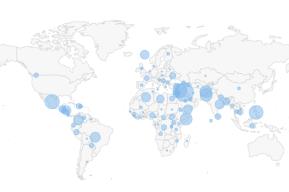News
Regional Initiatives for Exiled Journalists in Central America Presented at the International Day to End Impunity

Globally, the unresolved cases of journalist killings account for approximately 9 out of every 10 incidents, a stark number especially as we marked the 10th anniversary of International Day to End Impunity for Crimes Against Journalists (IDEI) on 2 November. According to the 2022 Director-General’s Report on the Safety of Journalists and the Danger of Impunity, Latin America and the Caribbean continues to be the region with the highest number of journalist murders. UNESCO figures indicate that 69 journalists from ten countries were killed in the region between January 2022 to July 2023. Non-lethal violence and threats, both online and offline, also continue to be a major concern.
Recognizing the urgent need for action, UNESCO and its partners gathered at the Organization of American States (OAS) in Washington, DC, on 3 November 2023 to call for the international community’s attention and support and to mark the International Day to End Impunity.
The discussion highlighted the challenges face by exiled journalists, the support they require and two UNESCO initiatives underway in Latin America and the Caribbean: a new regional hub as part of the global “Safe Spaces” project and a model law on journalists’ safety.
This project, supported by UNESCO’s International Programme for the Development of Communication (IPDC) began in 2022 with contributions from France, the Netherlands and Poland. It supports safe spaces for journalists in conflict and post-conflict situations, with a particular focus on displaced and diaspora journalists. Pilot phases are ongoing in Ukraine, Pakistan (for Afghan journalists) and Sudan to provide shelter, working spaces and the resources needed to continue working as well as training opportunities, and legal and psychological support.
We are at the highest point of attacks and assaults on journalism – it is radically different from how it was when I started as a journalist. And now, you learn from the beginning, when you start the profession, that you are the target.
It is difficult to measure the exact scale of the dangers and obstacles that exile journalists and independent outlets face in the region. Testimonies of individual cases, however, emphasize the breadth of the difficulty.
“We’ve had to adapt and evolve as the types of attacks we face have evolved,” explained José Luis Sanz, correspondent at El Faro, a Salvadoran digital news outlet that relocated its financial and legal structure out of the country in April 2023. Sanz stressed the challenges facing exile journalists, including the emotional impact and difficulties of migration, particularly for those with families.
In many cases, it becomes too difficult for journalists who have relocated to continue their vital work, as Carlos Lauría, executive director-elect of the Inter American Press Association, pointed out. Financial limitations, language barriers, migration challenges and legal proceedings all create substantial obstacles. Even those journalists who have escaped physical dangers often continue to receive threats. “Those who expel journalists will feel they have won if they succeed in silencing them,” said Lauría. “It is important to ensure that that is not the case.”
The International Federation of Journalists’ senior vice president, Zuliana Lainez, outlined key issues that must be considered, including physical security, livelihood, migration for the individual and, potentially, their family, ensuring that they can continue to practice journalism and legal support. She also made concrete proposals to assist exiled journalists, such as providing international press cards, coordinating response from networks of media employers and seeking support from the UN system.
We are not here talking only about protecting journalists – we are talking about protecting democracy. And in doing so, networks are more powerful than bulletproof vests.
UNESCO’s Rosa Maria González particularly highlighted the lack of reliable data on displaced journalists and how organizations in host countries are now overwhelmed by the magnitude of the situation.
The support of UNESCO and IPDC has advanced a promising multistakeholder initiative in the region: the development and socialization of a model protocol that can guide enhanced legal measures and policies on the safety of journalists. A model law is currently under discussion in the Chilean congress, where it now awaits Senate approval. It has also been presented to the congresses of Mexico and Paraguay.
Nicholas Benequista, senior director of the Center for International Media Assistance, further urged the international community, including a wide range of partners in attendance, to take action to bring both attention and financial support to the critical issue. This may, he noted, include the use of OAS and UN mechanisms such as the Universal Periodic Review.
The Panel was moderated by the Representative of the Inter-American Institute of Human Rights for South America, Eduardo Bertoni, who highlighted "the confluence of several dimensions of analysis around the problem of the safety of journalists in the region. Here we see a Working Agenda to address the reality of displaced journalists".
To learn more about UNESCO/IPDC’s ongoing work to strengthen the safety of journalists please visit here, and for further information about the global commemoration of IDEI visit here.





